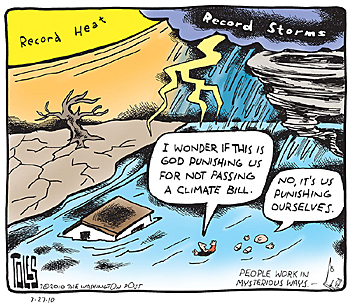sierraclub.org - sierra magazine - november/december 2010 - taking the initiative
By Carl Pope
Solutions From Unlikely Sources
Senate not up to the job? Let's put nature to work.
 Tom Toles, Washington Post/Universal Uclick
Tom Toles, Washington Post/Universal Uclick
Winter approaches, and it may be a harsh one. The bright promise of the 2008 election has faded under the shadow of economic collapse, our broken national politics, and increasing climate chaos. The savage abuse of the Gulf of Mexico by the oil industry is out of sight and increasingly out of mind. BP's use of toxic dispersants to keep the oil below the surface of the water turned out to be a great success politically—if not environmentally.
Hope has not been snuffed out, however. We just have to look for it in unlikely places.
Take the BP disaster, for instance. As I wrote earlier this year (see "The Next Flood," March/April), for decades we've contributed to the destruction of Gulf wetlands by building dams on the Upper Missouri and flood-control projects south of New Orleans and by allowing the oil industry to dismantle the web of wetlands that held the Gulf at bay. That slow, gradual mismanagement by the Army Corps of Engineers was lethal for New Orleans when Hurricane Katrina hit. Afterward, the Bush administration squandered its opportunity to restore the Gulf Coast. But now the BP debacle gives Obama's team its own chance. They can start by managing the Mississippi as a living river, letting it build up its delta and replace the 18,500 acres of south Louisiana that are otherwise eaten away by the sea each year. The wetlands and bayous can serve as a nursery to help oil-devastated fisheries recover, rather than as cheap highways for oil transport.
Washington, D.C., however, is the graveyard of good intentions. The politics of Gulf Coast restoration run up against upriver agricultural powers in addition to the oil industry. But the BP disaster is exactly the sort of crisis Obama's chief of staff, Rahm Emanuel, warns him not to waste. Louisiana can't survive many more of them.
Another unexpected place to find hope is under your kitchen sink. If you are like most Americans, you send your kitchen scraps to a landfill, where anaerobic bacteria convert them into climate-disrupting methane. Even if someone later tries to capture this methane and burn it, much will escape. But cities like San Francisco have shown that we can keep food waste out of landfills and turn it into rich, fertile compost by mandating its collection in large composting facilities. Recycling organic waste is ecologically far more important than sorting our glass and plastic; if implemented across the country, it could prevent the creation of methane equivalent to 147 million tons of CO2 per year—more than all the fossil fuel burned annually in Missouri.
A third opportunity lies in the restoration of America's heartland. Centuries ago, prairie soils were black with stored carbon. But nonnative crops, nitrogen fertilizers, and pesticides have stripped much of it away, sending 50 to 90 percent of the soil's carbon into the atmosphere as CO2. Merely planting food crops in rotation with nitrogen-fixing crops like vetch can put this carbon back into the soil at a rate of 3 tons per acre each year. At present, taxpayer subsidies for corn pay farmers to be overly reliant on fertilizer. If we invested those same dollars instead into preserving soil carbon, U.S. agriculture could become a major climate solution.
One thing these proposals have in common is that their success would be measured in decades, not quarterly reports or two-year election cycles. We need to get beyond the shortsighted approach of focusing on the crisis at hand and then moving on to the next flare-up. Our task, when looked on in this way, is to make it possible for natural processes to do their work—and then get out of the way.
CARL POPE is the chairman of the Sierra Club. E-mail carl.pope@sierraclub.org; read his blog at sierraclub.org/carlpope.